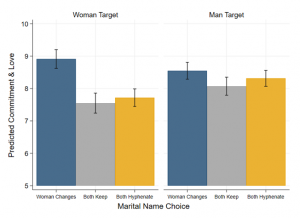Ten years ago, my husband and I eloped. We invited no one to observe the exchange of vows, but my family eagerly awaited the change of my surname. Three days after the ceremony, when we joined my family for a Christmas celebration, they asked why I hadn’t changed my name online. They were shocked when I told them I did not intend to change my name at all. A few minutes after the news settled, my family informed me that I was treating my husband poorly and that they really thought I should change my name. The experience left me feeling ill, and wondering whether most people in the U.S. thought women who kept their names were less than ideal romantic partners.
Researchers have shown that people view heterosexual women who change their names as more committed than women who keep their names, but it is unclear whether this is because name-keeping women don’t share a surname with their husband or because they break gender norms. To date, most studies have only compared women who took their husbands’ surnames (women who follow gender norms and sharea surname with their husband) with women who kept or hyphenated their surnames (women who break gender norms and do not share a surname with their husband), so prior research could not disentangle whether negative views of women are caused by their gender deviance or by their lack of a shared surname.
In a paper recently published in Socius, I report results from a survey experiment that asked people what they thought about the commitment and love of women and men in couples in which 1) women changed their surnames to their husbands’ surnames, 2) both partners kept their surnames, or 3) both partners hyphenated their surnames (women who share a surname with their husbands, but break gender norms). Comparing views of women across these three couples allowed me to isolate the potentially negative impact of breaking gendered marital name norms from the impact of not sharing a surname.
I found that women who break marital name norms are judged, even when they share a surname with their husband. This suggests the public (un)consciously judges norm-breaking women because of their gender deviance, not because they’ve failed to construct a family identity. The figure below shows that women who shared a hyphenated surname with their husbands were rated as 12% less committed and loving than women who changed their surnames. Women who kept their surnames were viewed as 13% less committed.

Predicted values based on linear regression models with covariates presented in Table 3 of Kelley, Kristin. 2023. “The Effect of Marital Name Choices on Heterosexual Women’s and Men’s Perceived Quality as Romantic Partners.” Socius 9:1-14.
Are men also rated as less committed and loving when they break marital name norms? I found that men in couples in which both partners kept their surnames were viewed as 5% less committed and loving than men whose wives changed their surnames. However, men in name-hyphenating couples were viewed similarly to conventional men. It appears that women’s commitment and love is more scrutinized on the basis of their marital name choices than men’s commitment and love. However, people do perceive men as having lower social status and less power when they or their wives break marital name norms.
Norm-breaking penalties likely discourage women and men from making egalitarian marital name choices. In light of these findings, it is no surprise that 87% of heterosexual women in the U.S. still change their surnames at marriage. According to Ellen Lamont, many heterosexual couples conform to traditional gendered dating rituals due to cultural pressure. My family’s opinions of my own marital name choice did not push me to the county clerk’s office, asking to change my name after all, but the experience has made me more likely to think about how I conform to standards of femininity in their presence, i.e. my own accountability to gender norms.
How might things change? Although unconventional marital name choices may initially result in backlash, the belief that norm-breaking women are less committed and loving may weaken as more couples keep, hyphenate, and blend their names. Given their higher status in society, men may be able to fast-forward progress if they choose to hyphenate or change their own names. Same-sex and queer couples are already showing us what name change utopia might look like. Lesbian, gay, and queer couples are more reflexive, flexible, and purposefully egalitarian about their marital name choices.
Kristin Kelley is a Research Fellow at the WZB Berlin Social Science Center. You can read more about her research at here and follow her on twitter @kelleykristink and LinkedIn.


Comments